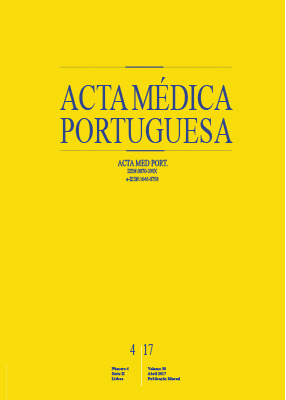Alterações Musculoesqueléticas dos Músicos de Orquestras Profissionais do Norte de Portugal: Comparação entre Instrumentistas de Cordas e Sopros
DOI:
https://doi.org/10.20344/amp.7568Palavras-chave:
Doenças Musculoesqueléticas, Doenças Ocupacionais, Dor Musculoesquelética, Música, PortugalResumo
Introdução: A literatura estabelece claramente que os músicos são um grupo com elevado risco de desenvolvimento de lesões músculoesqueléticas relacionadas com o trabalho. Os músicos profissionais de orquestra trabalham semanalmente durante várias horas e deparam-se frequentemente com a dor como consequência da sua profissão. O presente estudo pretende descrever a prevalência e a severidade das lesões músculoesqueléticas relacionadas com o trabalho que afetam os músicos de orquestras profissionais do Norte de Portugal, comparando instrumentistas de cordas e de sopros.
Material e Métodos: Cento e doze músicos das três orquestras profissionais do Norte de Portugal foram entrevistados individualmente de forma a determinar a prevalência e a intensidade da dor (medida pela escala verbal numérica de dor) das suas lesões músculoesqueléticas relacionadas com o trabalho.
Resultados: Aproximadamente dois terços (62,5%) dos músicos entrevistados apresentaram lesões músculoesqueléticas relacionadas com o trabalho durante a entrevista. Apesar de não se verificarem diferenças estatisticamente significativas, os resultados obtidos sugerem que as lesões músculoesqueléticas relacionadas com o trabalho são mais frequentes nos instrumentistas de cordas e mais intensas nos instrumentistas de sopro.
Discussão: Os resultados referentes à prevalência de lesões músculoesqueléticas relacionadas com o trabalho são similares a resultados de outros estudos realizados em diferentes países. Mais da metade dos músicos de orquestras profissional no Norte de Portugal apresentam diariamente dor leve a moderada.
Conclusão: Verifica-se a necessidade de realização de investigações futuras com o objetivo de estudar com maior profundidade os problemas profissionais que afetam os músicos em Portugal.
Downloads
Downloads
Publicado
Como Citar
Edição
Secção
Licença
Todos os artigos publicados na AMP são de acesso aberto e cumprem os requisitos das agências de financiamento ou instituições académicas. Relativamente à utilização por terceiros a AMP rege-se pelos termos da licença Creative Commons ‘Atribuição – Uso Não-Comercial – (CC-BY-NC)’.
É da responsabilidade do autor obter permissão para reproduzir figuras, tabelas, etc., de outras publicações. Após a aceitação de um artigo, os autores serão convidados a preencher uma “Declaração de Responsabilidade Autoral e Partilha de Direitos de Autor “(http://www.actamedicaportuguesa.com/info/AMP-NormasPublicacao.pdf) e a “Declaração de Potenciais Conflitos de Interesse” (http://www.icmje.org/conflicts-of-interest) do ICMJE. Será enviado um e-mail ao autor correspondente, confirmando a receção do manuscrito.
Após a publicação, os autores ficam autorizados a disponibilizar os seus artigos em repositórios das suas instituições de origem, desde que mencionem sempre onde foram publicados e de acordo com a licença Creative Commons









